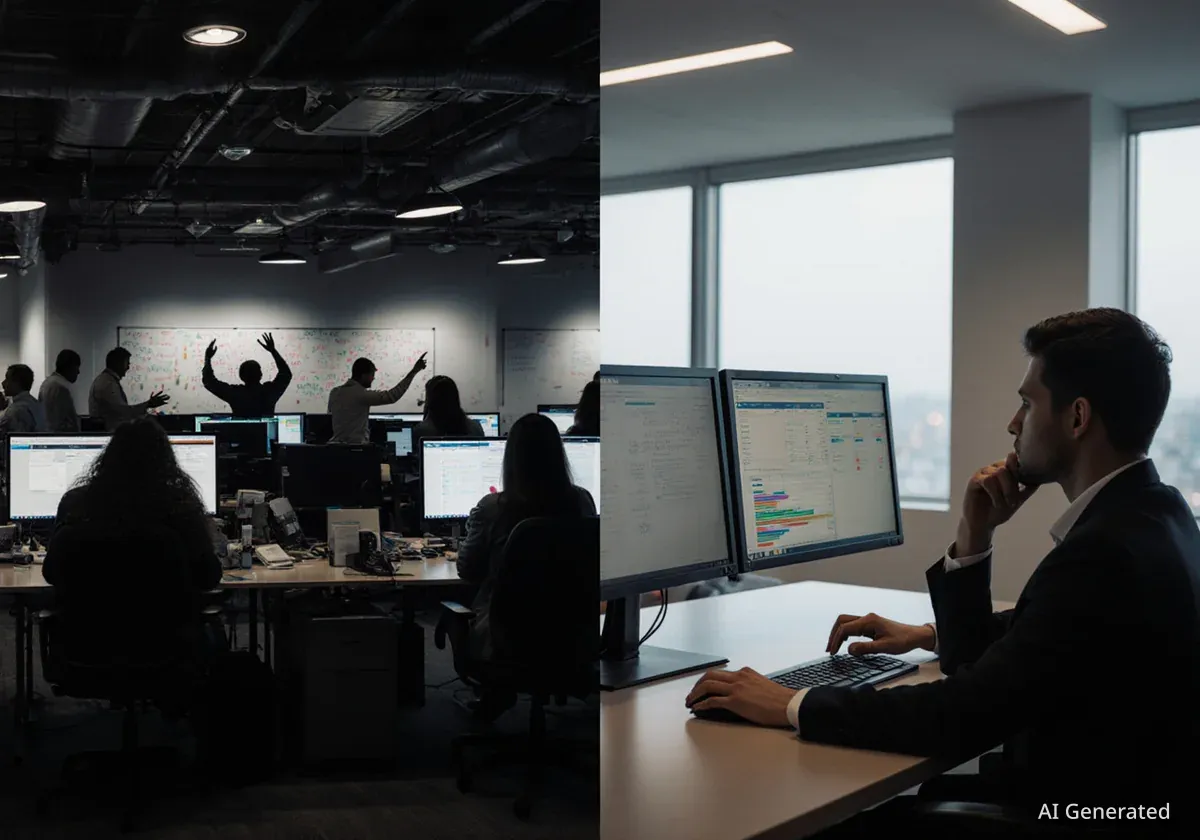Fifth Third Bank is outlining its strategy for implementing trustworthy artificial intelligence in the financial sector, a topic discussed in a new podcast from CDO Magazine. The discussion features Shanna Anderson, Senior Director of Customer Data & Insights at the bank, who explains the institution's focus on Model Operations (ModelOps) to ensure responsible innovation.
Joined by Or Zabludowski, CEO of the technology firm Flexor, Anderson detailed how the major U.S. bank is navigating the complexities of AI adoption. The conversation centers on building systems that are not only powerful but also transparent, fair, and secure, addressing key concerns in the highly regulated banking industry.
Key Takeaways
- Fifth Third Bank is utilizing a ModelOps framework to manage the lifecycle of its AI models, ensuring governance and reliability.
- The strategy aims to balance rapid technological innovation with the critical need for regulatory compliance and customer trust.
- Collaboration between financial institutions and technology partners is presented as essential for developing responsible AI solutions.
- The discussion highlights the importance of data governance in preventing algorithmic bias and ensuring fair outcomes for customers.
The Growing Need for Responsible AI in Banking
Financial institutions are increasingly adopting artificial intelligence to improve services, from fraud detection to personalized customer experiences. However, this integration comes with significant responsibility. Banks handle sensitive personal and financial data, making trust and security paramount.
The pressure to innovate is immense, but the risks associated with poorly managed AI are even greater. Flawed or biased algorithms can lead to discriminatory lending practices, inaccurate risk assessments, and a loss of customer confidence. Regulatory bodies worldwide are also intensifying their scrutiny of how financial firms use AI, demanding greater transparency and accountability.
What is ModelOps?
ModelOps, or Model Operations, is a set of practices that aims to streamline the entire lifecycle of AI and machine learning models. Similar to how DevOps revolutionized software development, ModelOps provides a framework for developing, deploying, monitoring, and governing models in a consistent and automated way. For banks, it provides a crucial control system to ensure models are performing as expected and in compliance with regulations.
This regulatory landscape forces banks to build robust governance frameworks around their AI systems. The goal is to create a clear line of sight from model development to real-world impact, ensuring that every automated decision can be explained and justified.
Fifth Third's Framework for Building Trust
In the podcast discussion, Shanna Anderson emphasized that Fifth Third Bank's approach is rooted in a structured, operations-focused methodology. By implementing a ModelOps framework, the bank aims to manage its AI models with the same rigor as its other critical business processes.
This framework addresses several key areas:
- Governance and Compliance: Ensuring every model adheres to internal policies and external regulations before and after deployment.
- Performance Monitoring: Continuously tracking model accuracy and effectiveness to detect any degradation or unexpected behavior.
- Bias Detection: Actively testing models for potential biases related to demographics like age, race, or gender to ensure fair outcomes.
- Lifecycle Management: Systematically managing models from initial concept and training through to retirement.
Anderson, who was named a 2025 Global Data Power Woman, represents a new generation of leaders focused on the ethical application of data. Her insights point to a cultural shift within banking, where data strategy is inseparable from corporate responsibility.
"Building trust in AI is not a one-time task; it's a continuous commitment to transparency and operational excellence. Our focus is on creating systems that are not only intelligent but also understandable and fair for our customers."
This perspective underscores that the technology itself is only part of the solution. The organizational structure and culture supporting it are equally important for long-term success and trustworthiness.
AI in Finance by the Numbers
According to industry reports, the global market for AI in the financial sector is projected to grow significantly. It was valued at approximately $14.7 billion in 2023 and is expected to expand at a compound annual growth rate (CAGR) of over 16% through the end of the decade. This growth is driven by the demand for process automation, enhanced cybersecurity, and personalized financial services.
The Importance of Strategic Partnerships
The conversation also highlighted the role of collaboration. Or Zabludowski, CEO of Flexor, provided the perspective of a technology partner working to equip banks with the tools needed for responsible AI. He stressed that off-the-shelf AI solutions are often insufficient for the unique demands of the banking industry.
Instead, successful implementation requires a deep partnership between the financial institution and its technology providers. This allows for the co-creation of solutions that are tailored to the bank's specific risk appetite, customer base, and regulatory obligations.
Zabludowski explained that modern ModelOps platforms are designed to provide transparency at every stage. They offer features like automated documentation, model versioning, and audit trails, which are essential for demonstrating compliance to regulators and internal stakeholders.
This symbiotic relationship enables banks like Fifth Third to leverage cutting-edge technology while maintaining strict internal controls. It allows them to innovate faster without compromising on safety or ethics.
Looking Ahead: The Agentic AI Era
The podcast is part of a broader series titled “CDO Strategies to Unlock Value in the Agentic AI Era,” signaling a look toward the future. Agentic AI refers to systems that can autonomously pursue complex goals, a technology that could further transform banking services.
As AI becomes more autonomous, the need for robust governance frameworks like ModelOps will become even more critical. The principles of transparency, fairness, and accountability being established today will serve as the foundation for managing these more advanced systems.
For institutions like Fifth Third Bank, the current investment in trusted AI frameworks is not just about meeting today's challenges. It is about preparing for a future where AI plays an even more central role in the global financial ecosystem. The focus remains on ensuring that as technology evolves, the commitment to responsible practices evolves with it.





